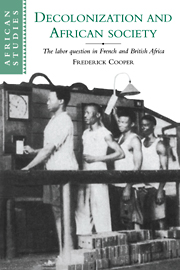Book contents
- Frontmatter
- Contents
- List of tables and figure
- Preface
- List of abbreviations
- Map of French and British colonial Africa
- 1 Introduction
- Part I The dangers of expansion and the dilemmas of reform
- Introduction
- 2 The labor question unposed
- 3 Reforming imperialism, 1935–1940
- 4 Forced labor, strike movements, and the idea of development, 1940–1945
- Conclusion: posing the labor question
- Part II Imperial fantasies and colonial crises
- Part III The imagining of a working class
- Part IV Devolving power and abdicating responsibility
- Conclusion
- Notes
- Bibliography
- Index
- OTHER BOOKS IN THE SERIES
3 - Reforming imperialism, 1935–1940
Published online by Cambridge University Press: 22 February 2010
- Frontmatter
- Contents
- List of tables and figure
- Preface
- List of abbreviations
- Map of French and British colonial Africa
- 1 Introduction
- Part I The dangers of expansion and the dilemmas of reform
- Introduction
- 2 The labor question unposed
- 3 Reforming imperialism, 1935–1940
- 4 Forced labor, strike movements, and the idea of development, 1940–1945
- Conclusion: posing the labor question
- Part II Imperial fantasies and colonial crises
- Part III The imagining of a working class
- Part IV Devolving power and abdicating responsibility
- Conclusion
- Notes
- Bibliography
- Index
- OTHER BOOKS IN THE SERIES
Summary
British officials were jarred from their complacency by the Copperbelt strike of 1935 and most importantly by the series of strikes and riots in the West Indies. French West Africa, unlike North Africa and Indochina, experienced no generalized or intense challenges. The Popular Front, however, self-consciously repudiated the colonial policies of previous governments, and when a strike wave came to French West Africa in 1936–37, it was more a consequence of reform – as African trade unionists saw and used a limited opening – than a cause of it. Yet whether the initial moves came from below or from above, French and British governments, trying to turn a new leaf in labor policy, strove to keep their initiatives within frameworks that remained thoroughly imperial. Both governments had great difficulty thinking about labor as a normal social category in an African context; faced with workers' troublesome presence, they wanted the labor question to be something else.
The most obvious explanation of why the period after 1935 opened up the labor question was the recovery from the Depression. As manpower needs rose, workers found that little had been done to improve resources, to make markets work more effectively, to provide decent housing. On the contrary, employers who had cut wages in the Depression were keeping them low even as prices of food and imported commodities began to increase.
Such trends caught up first with British Africa: labor forces were more concentrated in mines and cities. French officials, meanwhile, faced an important piece of unfinished business: forced labor.
- Type
- Chapter
- Information
- Decolonization and African SocietyThe Labor Question in French and British Africa, pp. 57 - 109Publisher: Cambridge University PressPrint publication year: 1996
- 1
- Cited by

